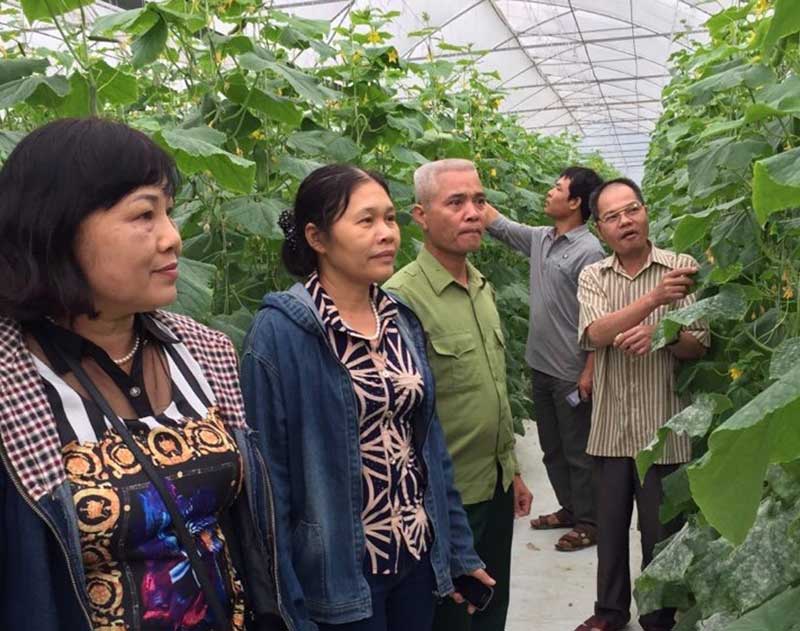
(HBO) - The movement of "Farmers emulate excellent production and business, unite to help each other to enrich and reduce sustainable poverty" is one of the three big movements launched by the Vietnam Farmers Association. These movements are widely spreading, contributing to the improvement of the material life, the spirit of farmers, the promotion of socio-economic development in rural areas in the province.

Farmers in other communes in Kim Boi district
visited to study the model of growing melon in green house according to VietGAP
procedure of Mr. Pham Tien Sinh – a typical production and business farmer in
Thanh Ha town (Lac Thuy).
wherever in all the Association levels, the
movement of "Farmers emulate excellent production and business, unite to
help each other to enrich and reduce sustainable poverty” have been developed
extensively. For example, Luong Son district has actively promoted and
replicated the model of excellent production and business households, which
helps 181 households escape from poverty. Through support activities,
consultations, farmers were aided to create a strong motivation; the number of
registered households reaches 65% of the total household members. Every year,
all levels of the Association have launched the emulation movement of excellent
production and business to 100% of communes, wards and towns and mobilized
farmers to register. In 2017, there were 72,695 households registered, in which
34,300 households achieved excellent production and business titles. The
provincial Farmers Association organized a conference to praise excellent
farmers in the province and award certificates of merit to 50 outstanding
farmers in 11 districts and cities. From the movement, there has appeared many
typical examples, many models of economic cooperatives, inter - cooperative
groups in production, processing and consumption of products in the value chain
to bring high economic efficiency. The typical farmers of excellent production
and business are such as Mr. Luong Van Suong, Na Loc village, Dong Chum commune
(Da Bac) with the model of forest tree planting, animal husbandry and business
services; Mr. Nguyen Duy Lanh, Bot village, Phu Thanh commune (Lac Thuy) with
business model of integrated farms; Mr. Pham Tien Sinh, Thanh Ha town (Lac
Thuy) with high-tech agricultural production model; Mr. Vu Xuan Oanh, Dai Dong
village, Ngoc Luong commune (Yen Thuy) with the model of Dien grapefruit
products.
In the spirit of "Party members go first, the people follow”, all households of Party members in the Doan Ket sub-region in Da Bac town, Da Bac district, voluntarily removed gates and fences, and donated land when the road expansion project passed through their properties. Inspired by their example, 68 households in the sub-region quickly followed suit, contributing over 1,400 sq.m of residential and perennial cropland to widen the main road through the residential area. The exemplary role of Party members in Doan Ket stands as a shining example of studying and following President Ho Chi Minh’s thought, morality, and lifestyle.
The Hoa Binh provincial People's Committee held a monthly meeting on May 29 to assess the implementation of socio-economic development tasks in the first six months of 2025, the progress of key projects, and some other important issues.
During his lifetime, President Ho Chi Minh always expressed his deep affection and special concern for children and youth. He once emphasized: "Caring for and educating children well is the responsibility of the entire Party and the entire people”; "First of all, the family (i.e. grandparents, parents, siblings) must do this job well”. "the Party Committees…, the Children’s Committee, the Youth Union, the education sector, and all related organizations must have specific plans to ensure children grow healthier and more progressive”. His teachings has been remaining valuable and serving as the guiding principles in the work of protecting, caring for, and educating children. In line with this ideology, Hoa Binh Province has continuously been prioritizing and investing resources in the well-being of children in recent years.
Mr. Nguyen Phi Long, the alternate Member of the Party Central Committee and Secretary of the Provincial Party Committee chaired the meeting of the Standing Committee of the Provincial Party Committee to provide opinions on several investment projects within the province. There was the attendance of Ms. Bui Thi Minh, the Permanent Deputy Secretary of the Provincial Party Committee and Chairwoman of the Provincial People’s Council; Mr. Bui Đuc Hinh, the Deputy Secretary of the Provincial Party Committee and Chairman of the Provincial People’s Committee and other members of the Standing Committee; the leaders from other departments, agencies, and some localities.
The Standing Board of the Vietnam Fatherland Front (VFF) Committee of Hoa Binh province held a meeting on May 28 to honour outstanding village elders, village heads, and reputable individuals from local ethnic minority and religious communities.
In mid-May, the provincial Museum organised an exhibition named "Duoi la co Dang Cong san Viet Nam quang vinh” (Under the flag of the glorious Communist Party of Vietnam). This meaningful activity took place in the joyful atmosphere to celebrate the country's major holidays and the Party congresses at all levels for the 2025-2030 term, towards the 14th National Party Congress.



